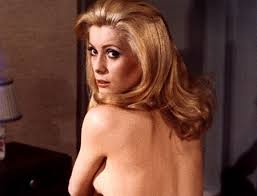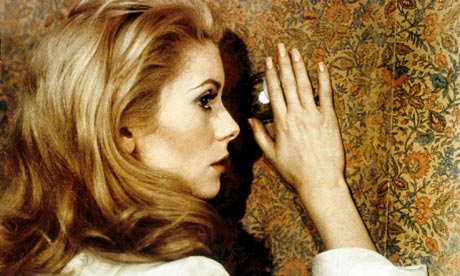'Sinemalı Pazartesiler'e tüm zamanların (bence) en erotik filmlerinden biri 'Belle de Jour'la dönüş yapıyorum. Belle de Jour, muhteşem sarışın Catherine Deneuve'ün mermerimsi soğukluğu ve sürrealist yönetmen Luis Bunuel'in okşayıcı kamerasıyla izleyicilerin gözlerine değil bilinçaltlarına bayram ettiriyor...
My return to 'Cinema Mondays' will be with the most erotic film in the world is; 'Belle de Jour'. Belle de Jour, with fabulous blond Catherine Deneuve's statuesque coldness and with surrealist director Luis Bunuel's caressing camera is a true feast not only for the eyes but also for the subconsciousness of the viewers...
The film is adapted from Joseph Kessel's 1928 novel with the same name is based upon a young bourgeois woman Séverine's sexual life. At the first glance, the story is very simple, Séverine crushed with masochist dreams and fantasies cannot find pleasure in her life with a caring but boring husband. When she goes to the brothel that their womanizer family friend Henri told her, she connects with her own sexuality and cause herself many troubles. The young gangster Marcel's obsession to her and Henri's discovery about her working schedule will destroy her 'cold bourgeois' reality with the 'elite prostitute' fantasy. Marcel shots her husband Pierre and Pierre has a stroke, thus Séverine disguises herself into a third role; "compassionate nurse".
Bunuel filmde kadın cinselliğini, toplumun kadına yaptığı baskıyı ve kadın rollerini sorgular. Hristiyan toplumda üç tip kadın vardır; anne ve ev kadını, fahişe ve rahibe. Anne sevecen ve sıcaktır, onun için cinsellik ancak kocasını tatmin etme ve üreme yoludur, fahişe de erkekleri tatmin eder, ama onun tatmininde sevecenlikten eser yoktur, 'kadınlığını para kazanmak için kullanır', rahibe ise ilahi bir aşk için cinselliğinden vazgeçer, bu vazgeçiş kadınlığını da kaybetmesi demektir, onda artık sadece inanç kalmıştır....
In the film, Bunuel questions female sexuality, society's constraint on women and women roles. There are three type of women in the Christian Society; mother and housewife, prostitute and nun. A mother is compassionate and warm, for her sexuality only serves to satisfy his husband and the way to breed, prostitutes also satisfy men, but there isn't any tenderness in their way, 'they use their womanhood for money' and nuns leave their sexuality behind for the 'eternal love', this also means her loosing her womanhood, there is only faith left there....
Séverine ise kadınlığıyla yüzleşmekten korkar. Hayalindeki mazoşist tutkuları kibar kocası ona sağlayamaz, bu Séverine'i soğuk yapar, yani aşırı tutkuları onu dondurur. Bu yüzden 'herşeyin yapıldığı' genelevleri duyduğunda onlardan hem tiksinir, hem de merak içinde kıvranır.
But Séverine is afraid to face her own sexuality. Her husband cannot provide the masochistic pleasures that she sees in her dreams, which makes Séverine frigide; in other words, her heated passions freeze her. Thus when she hears about the brothels she both loathes and wanders about them.
Bu hem kitabın yazıldığı, hem filmin çekildiği dönemde hem de günümüzde oldukça garip görünüyor değil mi? Hayatından sıkılan bir kadının fahişeyi oynaması imkansız geliyor, çünkü fahişelik her kadının istediği zengin ve sevgi dolu yaşamını tehlikeye sokuyor, kadını 'düşürüyor'. Bence tam da bu yüzden 'Belle de Jour' feminist bir film, fahişeliği erkeklere hizmet olarak görmüyor, Bunuel'e göre bu 'düşmek' anlamına da gelmiyor. Tersine kadınlar erkekleri ve onların garip fantazilerini kullanıp para kazanıyorlar ve yaşamlarını gayet iyi bir şekilde devam ettiriyorlar, yani düşmüyorlar tersine 'yükseliyorlar'.
It seems very unlikely both for the time that the book and film was realized and for today, isn't it? A bored wealthy housewife playing prostitutes seems impossible, because prostitution dangers the wealthy and happy life that every women desires and makes a woman 'fall' from grace. I think that for this reason, Belle de Jour is a feminist film. It doesn't see prostitution as serving a man sexually, rather men serve women to live better lives because of their fantasies, and it's not certainly to 'fall from grace' but a rise at least economically.
Öte yandan Séverine, diğer fahişelerden ayrıdır. Öncelikle ötekiler sevecenlik rolu yapıp müşterilere kur yaparken, Séverine tüm saygınlığı ve soğukluğuyla bir heykel gibidir, erkekleri çağırmaz, onların gözünü korkutur. Bu onu evin en gizemli kadını haline getirir, Séverine'e ulaşmak ve ona zevk vermek imkansız gibidir, bunu ise kanun kaçağı tehlikeli Marcel'de bulacaktır. Marcel Séverine'e karşı serttir, onu aşağılar ve bu tam da Séverine'in bütün fantazilerinde istediği şeydir.
On the other hand, Séverine is different from all other prostitutes. Others try to lure the customers by roles of compassion and love, while Séverine stays like a statue with all her dignity and coldness, she doesn't lure men, she rather intimidate them which drives them crazy of course. This makes Séverine the most mysterious woman in the house, reaching Séverine seems impossible, but the dangerous crook Marcel will win this game. Marcel is harsh with Séverine, he humiliates her, which is exactly what Séverine wanted from the beginning.
Marcel onun saygınlığını yerle bir eder, bunun işe yarama sebebi ise Séverine'inin cinselliğinin çocukluğundan beri aile, kilise gibi kurumlar tarafından bastırılmasıdır, cinselliğe (daha doğrusu) kadın cinselliğine karşı o kadar çok yasa vardır ki, Séverine zevk almayı günah olarak kabul eder. Ancak bir fahişeyken bütün bu kurumlardan bağımsızdır, Marcel'in onun kendi içindeki tabuları yerle bir etmesiyle de Séverine gerçek doyuma ulaşır.
Marcel destroys her dignity and this works because her sexuality is suppressed since her childhood by constitutions like the family, the society and the church, there are so many laws against (female) sexuality that she considers the pleasure as a sin. But she frees herself from all the societies when she is a prostitutes and Marcel destroys her own taboos which brings her to the edge of satisfaction.
Simply, the daily life that Séverine has with her husband represents her consciousness, or her 'reality', the fantasies and dreams represents her subconsciousness or her 'fantasy world'. Séverine's problem begins with her fantasies appearing for no reason in her daily life. A couple of little accidents at home are the first breaking points in her daily life, with the breaking of a perfume bottle, then a vase will unsettle her perfect woman status. Strangely, these little accidents will drive her to the brothel.
At first, the brothel also represents her fantasy life, but with Henri's discovery of her favorite pastime, it will become a force that can ruin her real life. With her husband's stroke, Séverine must give up both roles and will transform into a 'nun', her sole purpose is now to take care of her husband. This role will also be destroyed with Henri's revelations to her husband and at the end of the film, only her fantasies are left for Séverine, but this time, the fantasies will not be about sexuality, but about his husband's miraculous recovery. With the end, we leave Séverine entirely captured by her fantasies....






No comments:
Post a Comment